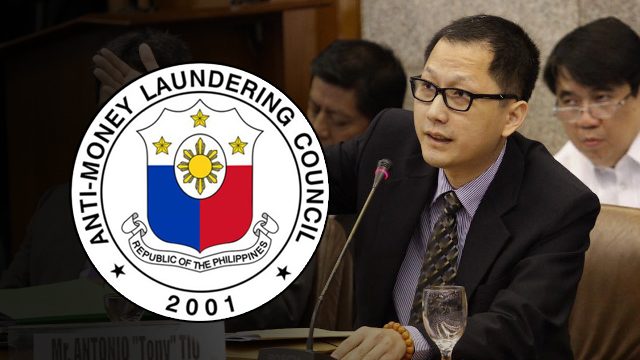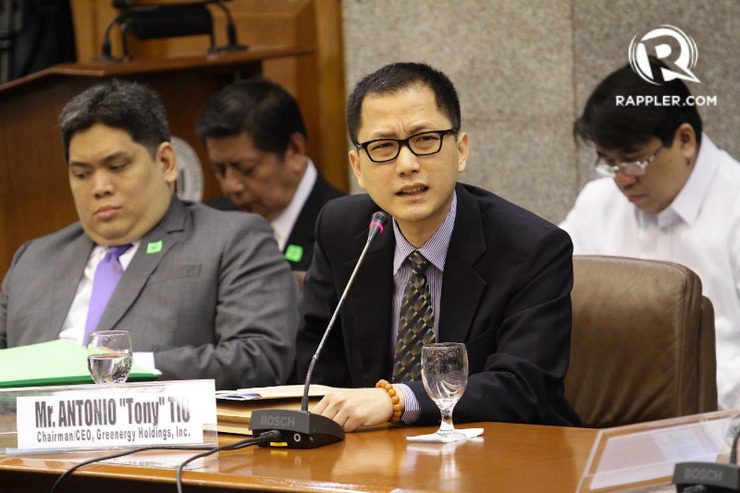SUMMARY
This is AI generated summarization, which may have errors. For context, always refer to the full article.

MANILA, Philippines – Billionaire Antonio Tiu on Monday, May 18, hit back at the Anti-Money Laundering Council (AMLC) for producing what he called a “malicious” investigation meant to “harass” him.
Tiu, who built his multi-billion peso agriculture empire, is accused of being Vice President Jejomar Binay’s dummy. (READ: Can Antonio Tiu tell a lie?)
Previously a fairly low-key businessman, Tiu’s name was dragged into the spotlight in October 2014, during the Senate blue ribbon sub-committee’s hearings on allegations of corruption against Binay.
Whistleblowers and senators leading the probe allege that Tiu is merely acting as Binay’s front when he claimed ownership of Sunchamp Agri-tourism Farm, a Rosario, Batangas, property that is allegedly really Binay’s.
Tiu owns around 30 of the 242 bank accounts ordered frozen by the Court of Appeals (CA), in reaction to a petition filed by the AMLC. The CA ruling is based on the AMLC’s findings, which froze 5 of Binay’s accounts, as well those of his alleged dummies.
For the 39-year-old businessman, the CA decision means all of his accounts – personal, company, and joint accounts shared with his brother and mother – will be frozen for 6 months.
Tiu refused to say how much of his money was frozen by the CA order, but the businessman’s net worth easily hits a billion pesos.
One of the transactions flagged by the AMLC, said Tiu, was anything but dubious. The council’s “brilliant…business [and] legal minds” should have understood this, the businessman said.
“That’s why I would like to think that there can be only two reasons: either they don’t know what they’re doing, or they’re being used to politically harass me,” he told Rappler.
The businessman had earlier cried foul over what he claimed to be the government’s “full-strength” attack against him and his companies, supposedly because he refused to “cooperate” in the probe.
Fresh from a business trip from Europe, Tiu sat down with Rappler to refute the AMLC’s findings, as cited in the CA resolution:
CA resolution: The investigation into the bank accounts of Greenergy, Earthright, and Sunchamp revealed multiply transactions involving receipt of inward remittances, inter-branch fund transfers, cash withdrawals and cash deposits among the accounts of these entities, of the SPCMB Law Office and of Tiu from 30 June 2014 to 2 July 2014 alone.
The entry there refers to the sale of the powerplant. The sale of the powerplant was transacted between the lawyer of our minority stakeholders in the biomass powerplant, which is Cleantech. They have a law firm and I had a law firm. The law firm transacted the transaction on our behalf.
This was end of June [2014]. This was publicly disclosed.
Rappler: But this was flagged by AMLC.
The malicious part there is that this transaction is public knowledge. If this transaction is anomalous, they should have flagged it down the moment the money was wired because it’s a significant amount and it went, it coursed through bank-to-bank transaction. It was publicly disclosed as well so there is really no reason why they try to create the perception that it was a money laundering activity.
When you say money laundering activity, it involves a party with dirty money asking a legitimate businessman to go through the account, transfer the money to some accounts that would bring back the money to the original funder. In our case, it’s a legitimate transaction where [I] myself own the power plant, I sell it, the money goes to my account, I use the money, reinvest it into my other companies, so where is the money laundering part there?
I cannot believe it, that this kind of situation could happen.
Rappler: This transaction involves which of your companies?
This transaction involves Greenergy, where Greenergy divested its 60% stake in Biomass holdings that owns 64% of San Carlos biopower in San Carlos, Negros. The buyer is also disclosed, which is a minority owner of Biomass Holding, Cleantech Fund, managed by Tomas Lloyd.
CA resolution: The investigation further revealed that despite Tiu’s supposed business losses in 2012 and comparatively small net profit of P22.45 million in 2013, the accounts under his name showed multiple large transactions.
It’s normal for an investment and holding company to invest in projects and at the end of the day, we may divest from the project at a profit or a loss. So it doesn’t that when we are losing money on the books, we are not able to raise money or there won’t be any large transactions because we are an investment holding company.
An investment holding company is a company created to own businesses. Unlike a purely trading company where you buy and sell, when you buy and sell there’s a daily transaction. When you talk about a holding company, it’s a mother company that owns a lot of subsidiaries by investing money into projects. So the way to make money is to make the subsidiary successful so you can divest the ownership of the subsidiary in a future time with the windfall profit or you can profit from its dividends.
Rappler: When the company losses money, how do you get it back to reinvest?
Because we’re publicly listed, we have the ability to raise money from public sources, meaning individual investors, institutional investors, investment bankers, so this is the difference between and public and private company.
Rappler: But AMLC would have known that.
Based on our logical mind, we would have assumed that the AMLC should have the brilliant mind and the business mind, and the legal mind to understand this kind of transaction. That’s why I would like to think that there can be only two reasons: either they don’t know what they’re doing, or they’re being used to politically harass me.
Rappler: You call it political harassment. But the AMLC has a very good track record.
Not until they released the report to the public Monday.
Rappler: It wasn’t leaked by AMLC. Reporters got a copy from the CA. And if it’s submitted to the CA, it’s a public document.
After that report came out Monday, I doubt the credibility of the AMLC.

Rappler: For ordinary people, it would make sense, the transactions of the company…if it’s able to source investments from alternate sources. But in your case, you’re saying that at some point, you were losing but you were able to gain money and funds.
No. This entire narration in the report is a total false description. They tried to capture previous articles about my company losing money and despite the losses I’m able to raise money. This is a very wrong perception because in the financial statements of the holding company, if you invest in projects that are start ups, logically at the end of the business year or accounting cycle, you have to book paper loss but that doesn’t mean the company is losing. You can only say that the holding company lost money upon the divestment of the project. In which case, we divested the project two years later so we received the proceeds back.
Receiving the proceeds back is not from the investment, it’s not similar to what the title claims that my companies are losing money and yet I’m able to raise money. These are two completely different things. And even if, assuming my company is losing money, it also does not co-relate to my ability to raise money because even if my company is losing money, I can still issue shares of stocks to individual investors who are willing to give me money to further invest in future projects.
The two do not correlate.
Rappler: But you have to be able to show good projects to get your investments. Was that the reason why –
I think people who know me know my track record. I have built an agricultural enterprise over a span of 20 years and that’s my track record. I made it public and this time, I started this holding company that is going to invest in renewable energy so logically, for the first few years, we will be in the red on paper.
That’s why despite the fact that it’s a start-up, it’s not making money in the first few years, people still entrust me with money, institutions lend money and invest in me – it’s because of my track record in the other company.
Rappler: Until your association with Binay.
Until I got associated by perception, so a lot of things changed and I was not able to do anything since these allegations broke out.
Rappler: Even in the AMLC report, which is even more detailed in the CA resolution, you would see questionable transactions. A lot of money moving, and this does not correspond to the [Vice President’s] SALN.
I’m not privy with the transactions of the Vice President. For the transactions of the Vice President, you should adress the questions to him so. On my part, I am 100% sure that the AMLC report is really malicious and baseless based on the part that they wrote about me. I’m 100% sure that I can justify it legally…any time, anywhere. – Rappler.com
Add a comment
How does this make you feel?
There are no comments yet. Add your comment to start the conversation.